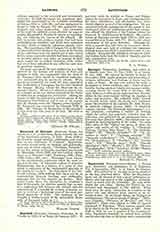

Raynaud, THÉOPHII.E, theologian and writer, b. at Sospello near Nice, November 15, 1583; d. at Lyons, October 31, 1663. He entered the Society of Jesus, November 21, 1602, taught grammar and humanities at Avignon, philosophy and theology at Lyons and for a time at Rome. He was very zealous for souls, a theologian of broad erudition, and a writer of great fertility, having produced ninety-two separate works, covering almost the entire field of theology. His style, however, is often prolix and sometimes obscure, whilst in his controversial writings he indulges in satire and invective. His collected works, revised by himself shortly before his death, were published under the direction of his confrere, Fr. John Bertet, in nineteen volumes (Lyons, 1665). A twentieth volume, entitled “Th. Raynaudi Apopompieus” (i.e. the scapegoat), containing a number of writings which the author had purposely excluded from the collection, was published by an anonymous editor a few years later (Cracow, 1669); this volume was condemned by the Congregation of the Index. The main titles alone of the ` Opera” are given, to show the nature and extent of his writings: I. “Theologia Patrum: Christus Deus Homo”; II. “De Attributis Christi”; III. “Moralis disciplina”; IV. “De virtutibus et vitiis”; V. “Theologia naturalis”; VI. “Opuscula eucharistica”; VII. “Marialia”; VIII-IX. “Hagiologium”; X. “Pontificia”; XI. “Critica sacra”; XII. “Miscella sacra”; XIII. “Miscella philologica”; XIV. “Moralia”; XV-XVI. “Heterochta spiritualia”; XVII. “Ascetica”; XVIII. “Polemics”. XIX contains general indices.
EDWARD C. PHILLIPS

